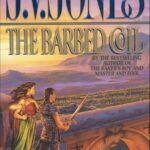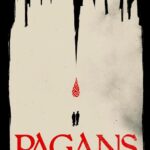
Genres: Adult, Fantasy, Contemporary or Urban Fantasy, Queer Protagonists
Representation: Bisexual MC, sapphic love interest, secondary BIPOC characters
Published on: 13th May 2025
ISBN: 125083502X
Goodreads

Naomi Novik's Scholomance series meets Plain Bad Heroines in this sapphic dark academia fantasy by instant national and international bestselling author Emily Tesh, winner of the Hugo and World Fantasy Awards.
"Look at you, eating magic like you're one of us."Doctor Walden is the Director of Magic at Chetwood Academy and one of the most powerful magicians in England. Her days consist of meetings, teaching A-Level Invocation to four talented, chaotic sixth formers, more meetings, and securing the school's boundaries from demonic incursions.
Walden is good at her job―no, Walden is great at her job. But demons are masters of manipulation. It’s her responsibility to keep her school with its six hundred students and centuries-old legacy safe. And it’s possible the entity Walden most needs to keep her school safe from―is herself.
I received this book for free from the publisher via NetGalley in exchange for an honest review. This does not affect my opinion of the book or the content of my review.
Highlights
~the BEST reason for no-phones-in-class
~a possessed photocopier
~swords > guns
~teachers as paladins
~never trust a dude who’s not peer-reviewed!
INSTANT new fave, EASILY a best-of-the-year, and I am officially declaring Incandescent the definitory example of the magic school trope!
Incandescent is very obviously in conversation with other big-name magic school books, and with the readers who fell in love with the trope (sub-genre?) as children. But those readers have since grown up, and so this is a book for adults; written with, not just an adult’s perspective on the school and students of this particular story, but with an adult’s perspective on the concept of magic school. And by choosing to set the book in England, firmly within the institution that is British Private Education, Incandescent stands as a very self-aware foil to the-series-that-must-not-be-named, specifically.
Plus, the use of magic as a not-too-subtle metaphor for wealth and or privilege??? With natural sorcerers as stand-ins for those one-in-a-gazillion ‘normal’ people who make it by ‘pulling themselves up by the bootstraps’ (aka freak luck)??? My gods, I can’t believe how simply, elegantly, and perfectly well-done that was! *chef’s kiss* Tesh is a GENIUS.
And that would be enough to make it a really excellent book, but there’s a whole ‘nother level of excellence to the fact that Tesh manages to rip apart this fantasy without ripping apart those who love it. Is the whole concept of British boarding schools deeply problematic? Yep! In a whole lot of ways! Are there very dodgy elements and connotations to most aspects of the magic school trope? Ohhh yes. But Tesh leaves room to acknowledge that these facts do not negate what people love about these schools, British or magical (or both); to explore how people can love them, how these things can be deeply meaningful to individuals, flaws and all. This is not a book that browbeats you for enjoying something problematic; it is, instead, a book that asks you to look at the thing you love straight-on, to see it wholly and unbiasedly, to know what it is you love.
If you still love it after that? That’s your business. Incandescent did not seem, to me, to be pushing an agenda, to be guiding readers to a specific conclusion. It just wants you to see, and to be honest about what you see. Don’t love blindly. That’s all.
Which is all very High Brow and philosophical, but Incandescent isn’t just a deeply clever, incisive book: it’s also a genuinely entertaining novel, a freaking BLAST of a read that I could not put down and did not want to! So much of it made me laugh; more than one moment had me kicking my feet; there were a lot of happy-rambles to the hubby about the cleverness of the writing and the very neat worldbuilding; and there was a great deal of flailing, both the delighted kind and the very anxious kind!
“Oh shit,” said Nikki, staring at the streaks of black and yellow paint.
Will paused.
“Language,” said Aneeta, with a glance in Walden’s direction.
“Actually,” Walden said serenely, “‘Oh shit’ is the correct reaction to finding an error in an incursion ward.”
Walden is the deputy headmistress and Director of Magic at Chetwood Academy, responsible not just for teaching high-level magic, but for the magical protections of the school. And – this is really important – she loves her job. She loves magic, and she loves teaching, and she loves Chetwood, and all that love just emanates from the pages. Incandescent reads very much like a love letter to teaching and teachers; it gives the book an occasionally bizarrely wholesome feel, almost cosy at times. All of the staff at Chetwood seem to love what they do – even when things are hard, when students are badly misbehaving or suffering or having to fight off being eaten by their phones, there’s a joy and satisfaction to all of it. It’s almost enough to tempt me to go into teaching!
Teaching wasn’t about being right, or being clever, or being in charge. It was about making them believe.
You manipulate his perceptions, the [spoiler!] said, to make him stronger.
And again – in the same way that Incandescent is a conversation with all of us as adults who were kids reading the-series-that-must-not-be-named…it’s also talking to all of us as adults who were kids in school. Any school. If you went back to high school and talked to your favourite teacher now, as an adult, it might feel a bit like reading Incandescent does: like we’re getting a tour behind the curtain that is/was our childhood schooling, and wow is there a lot we never imagined existed back there! It feels like a teacher addressing you adult-to-adult, revelatory and mundane at once; there is something fascinating in learning a little of how teachers perform a role when in the presence of their students, or in the realisation that oh yes, they feel awkward and silly and uncool too, all those things you thought teachers were somehow immune to.
Which all means that even the most banal bits of Walden’s day feel like we’re being let in on mysterious, magical secrets. Tesh’s prose is so readable, quick and compelling and precise, always giving us exactly the right amount of detail about exactly the right things, perfectly balancing moments of introspection with wonderfully human dialogue and heart-pounding action – though maybe ‘activity’ would be a better word, because it’s not all action-thriller stuff, but even the littler moments feel vital and meaningful.
“No blood,” said Walden firmly. A meal of human bodily fluids was the fastest possible way ot turn a minor demonic possession into a major demonic problem. “Would you accept a digestive biscuit?”
The fiery flecks of the purple eyes in the depths of the multipurpose tray flickered. The imp said, with an air of deep cunning, Chocolate.
And fun. Incandescent is so much fun! I loved the teenagers and their shenanigans; I loved the surprises embedded in the worldbuilding; and I was surprised at how much I loved the English setting. Clearly I’ve been reading too many books set in the US! I’m not saying it made me nostalgic (gods forbid) but it did make me some strange kind of delighted to see all the familiar Briticisms, the school system I grew up in, the terminology I remember and still default to; Year Nines, A-Levels, digestive biscuits!
But it also made me really happy to see that setting called out.
Mark was exactly the kind of person that Chetwood School existed to create: powerful, free, capable of anything, capable of getting away with anything.
This is not a cosy fantasy, even if parts of it are heart-warming. Incandescent is a book about power and who has it, who can have it, what it costs (what it costs different people). It’s an incisive, merciless vivisection of capitalist power structures, of buying power via buying schooling, of a rancid, rotting system of education that was built to support and feed into the British Empire and is still deeply imperfect. It’s about arrogance and wealth and privilege, and how people without any of those things mortgage their souls to get their children a chance at them–
Chetwood’s school fees were insurance money, a policy taken out against the future. Let my child be safe. Let my child be happy. Let my child have every single chance at freedom, joy, hope, power.
Incandescent is condemnation and sympathy: for those who built the system on one hand, and for those who beggar themselves to get their children a better place in that system. It’s an acknowledgement that even once we realise how fucked up this all is, we can’t necessarily get ourselves free of it. We should burn it all down and start over – but we can’t.
the sheer weight of institution carving patterns into the world, stronger than blood or bone.
There is a deep well of something like cynicism in Incandescent, an awareness of a great and toxic ugliness at the heart of what Walden loves so much. There were times when it seemed to me that Tesh was even pointing out how messed up schools are, not as a fundamental part of the institutions of power but as a way of teaching at all. Exams are a terrible way to gauge a child’s intelligence! Boarding schools are functionally prisons for minors! We constantly undervalue people who are geniuses at their Things just because they never went to school for it! All of it dressed up in elaborate ritual and civility, when really, the simple, savage brutality the demons in this setting constantly enact on each other is only a more honest mirror of the machinations amongst humans – amongst the worst humans, anyway. Which is probably a big part of why Incandescent has been called dark academia in so many corners…
But it’s not, really. Because Incandescent is also about believing in something much bigger than you, greater than you. It’s about dedicating yourself to an ideal, and spending your entire life working to live up to it, to manifest it, to remake the world in its image, one student at a time. It’s about teachers as paladins, about teaching as – as something holy. Which is not quite the right word, but is so close.
What else can you call being willing to die to protect the children in your charge – children who are not your flesh and blood, even? (But maybe have more of you in them than they do their parents, after spending most of their lives in your classrooms.)
And a certainty: this is what I have done. Here is power, and here are power’s consequences. I can point to them. I can name them. Here is the child who knows today what she did not know yesterday. She will take her knowledge away into adulthood and find her own terrible strength there. Those are her choices. These, circumscribed, limited by ancient stone and crumbling concrete, by time and tradition and school bells and school boundaries–these are mine.
I feel like I could go on and on endlessly: this is a book I would love to offer to a classroom of English Lit enthusiasts, because there is so much to it, so many layers, and all of them fitted so perfectly together, like the gears of the world’s tiniest clock. It’s the kind of book that rewards analysis, that delights in you thinking deeply about it, that encourages you to. I want to write you an essay about the worldbuilding (simple at first glance, so freaking clever when you pause to think about it) or the foursome that are Walden’s top students (they each represent a different perspective/experience on/of modern schooling) or how amazingly complicated, multi-faceted, and believably contradictory a character Walden is (I straight-up love her and there’s nothing straight about it) – but you should really just READ THE BOOK FOR YOURSELF!
Incandescent is, simply, incandescent.
It’s out today. Go read it!








*immediately adds Incandescent to reading list*
This sounds phenomenal (and AWESOME review!) – thank you for putting it on my radar! 💖
YAY! Hee, that makes my day, thank you! I hope you love it as much as I did! :D
Love this review!! This book really does do an excellent job of balancing critique of assorted tropes with being an actually entertaining fantasy story.
Thank you! :D and I KNOW RIGHT?! You could ignore (or miss?) all the critiques and stuff and it’s still a ridiculously great book – I feel like most of the time, books with critique like this wouldn’t be able to stand without it, you know? But not Incandescent! Also, I forgot to mention it in the review, but I’m really impressed that everything Tesh has published so far is so wildly different! She is NOT just sticking to one lane!